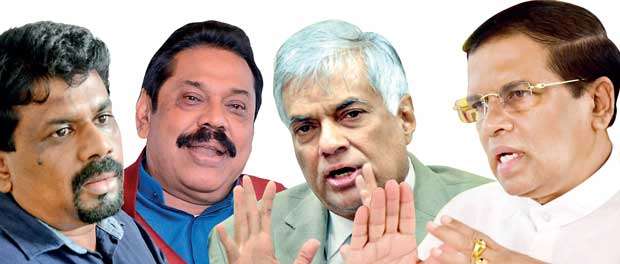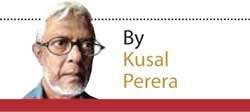From Anura’s to Mahinda’s 20 21 A Whatever befalls 20A, one would have to expect Mahinda to press his demand for a Parliamentary Election- with 21A up his sleeves

Mahinda Rajapaksa, therefore, cannot afford to play between Parliamentary and the Presidential Elections
Political fact that abolition would make them nonentities in a Parliamentary Election
The 20th Amendment to the Constitution is basically a correction to the 19A
for Mahinda to gamble with an undecided Parliamentary Election does pose the already fixed 2020 Presidential Election as a hassle
They should all fall in line in voting for the 20A
Posters adorned city walls last week, saying the 20th Amendment to the Constitution would, “Divide the Country”.

 The JVP-initiated the 20th Amendment to the Constitution is basically a “correction” to the 19A this hybrid “Yahapalana” Government adopted with JVP also voting for it.
The JVP-initiated the 20th Amendment to the Constitution is basically a “correction” to the 19A this hybrid “Yahapalana” Government adopted with JVP also voting for it. A “correction” in terms of the main and the major pledge made during the 2015 January Presidential Election campaign.
Abolishing of the Executive Presidency was the social pledge on which Maduluwave Sobitha Thera’s Movement for Social Justice originated.
It became the rallying point for the “vocal activists” in Colombo, who wanted a single-issue Common Candidate.
Thus the 19A became the consensus on which Maithripala Sirisena was ushered in as the Common Candidate to defeat President Rajapaksa, the UNP hierarchy and the Colombo middle-class believed, was not possible, otherwise.
It was evident from day one that the Yahapalana leadership was in no mood to abolish the Executive Presidency as promised, even though President Sirisena, yet again told the nation a few days after his swearing in, that “the Presidential Election he contested would be the first and the last Presidential Election he would contest.”
The 19A made certain the Executive Presidency remained with a few trappings, while Wickremesinghe as the Prime Minister wrote ‘clauses’ into it, to allow him control over the Government. This has proved a complete flop, with President Sirisena encroaching into everything he believed would make him a ‘full-time President’.
Yet today, those same urban groups and political leaders seem reluctant to abolish the Executive Presidency. All of them have instead taken over the burden of naming their own choice as the next President in 2020.
It is within this mad rush in naming and grooming Presidential Candidates for 2020 that the JVP leadership brought the 20A, expecting all, who backed the Yahapalana Rule to stand by their three and a half-year-old promise.
Theoretically yes, they should all fall in line with the JVP in voting for the 20A. In practical Sri Lankan politics, no they will not stand by an old promise, they believe would spoil their scheming to gain power the ‘next time.’
The new unofficial and undeclared alliance that has therefore emerged in opposing the 20A is more vocal and conspicuous than that which would back it.
The curry leaf groups in the Joint Opposition like Wimal Weerawansas and Gammanpilas were initial voices that opposed the 20A when the JVP first announced it would move the 20A to abolish the Executive Presidency.
These two claim the abolition of the Executive Presidency would lead to “division of the country”.
It is too old a canard to gulp whole. Starting from Ceylon, Sri Lanka lived without an Executive Presidency for 30 years after Independence but never had this issue of separation due to the absence of an Executive Presidency.
It is not the Executive Presidency that would divide Sri Lanka. It is the refusal to respect Tamils and Muslims as equal in citizenry to Sinhala Buddhists and continued denial of their right to equal opportunities within a secular State that would lead to division.
These political flunkies have other reasons to oppose the abolition of the Executive Presidency not openly and directly articulated. It is the political fact that abolition of the Presidency would make them nonentities in a Parliamentary Election.
In a parliamentary election that comes without an executive presidency, they will not be considered of any worth, in any alliance.
Gotabhaya was the Glyphosate that wiped out all minority votes from Mahinda. Can Mahinda, therefore, allow Gotabhaya to supersede his political career as the all-powerful president?
In the absence of a Presidency, the Parliamentary Election in the Sinhala South would be dominated by Mahinda Rajapaksa, the UNP and if the SLFP does not get morphed into Mahinda’s SLPP, then a fractured and limping SLFP led by President Sirisena, with the JVP tagging behind.
Unprincipled political loners like Champika Ranawaka would decide at the last minute where they should land themselves, depending on who is likely to form the next Government.
In such political context, Mahinda Rajapaksa has now proved he can spearhead a campaign on his own and is confident his SLPP on its own would romp home victorious in the next Parliamentary Election.
His show of ‘people’s faith’ in him at the Galle Face May Day rally and again at the launch of the SLPP in Anuradhapura last year, made him “go it alone” at the LG elections in February.
That LG election campaign had no actual role for these curry leaf politicians. Not even for the JO, which is basically a Parliamentary voice and not one that commands votes outside Parliament?
Therefore, for Gammanpila, who now stands accused as a ‘financial rogue’ in a court case that is being heard and for Weerawansa to be politically valid, they need another Sinhala Buddhist Common Candidate they could campaign for.
Gotabhaya Rajapaksa, therefore, becomes their choice for the 2020 Presidential Election. It is thus obvious, they have to oppose the 20A. If the 20A goes through Parliament with the necessary 2/3 majority, they would not have a Presidential candidate to keep them politically alive.
So will it be for the likes of Champika and even for Gotabhaya and his ‘filthy rich’ Sinhala Buddhist professionals and businessmen.
All these individuals who have no proven vote base, need the Presidency to rake in “curry leaves and onions” around them and therefore have to oppose the 20A.
For the UNP and its leadership, having the Executive Presidency is necessary, but is saddled with the never answered question, “can we face it?”
Present UNP leadership avoided two consecutive Presidential Elections, opting to support Common candidates, purely because they were afraid to contest on their own.
It is not the Executive Presidency that would divide Sri Lanka. It is the refusal to respect Tamils and Muslims as equal in citizenry to Sinhala Buddhists and continued denial of their right to equal opportunities within a secular State that would lead to division
The National list UNP Samasamajist MP Wickramaratne’s argument that the 20A is nothing to be afraid of and that it poses no separatist threat is yet to be officially accepted by the UNP.
So, is the dilemma within the Maithripala Sirisena camp. It is for this reason the JVP keeps demanding the President and the PM to publicly say where they stand on the 20A and abolition of the Presidency.
For Mahinda too, it is too early to say where he actually stands on the 20A. A month ago, he told media he would consider the 20A if Parliament elections are also tied to the 20A.
This meant, if abolishing of the Presidency provides for an early Parliament Election, he could consider supporting it.
What makes him hesitant is the fact, he and his family have tasted the power of the Executive Presidency and knows what a delicacy it is, to let go.
For Mahinda, therefore, to be PM that would make him sit in Parliament answering questions raised by the Opposition is too much of a responsibility.
For that reason, he was pushing for a Parliamentary Election, in a scenario that did not question the role of Presidency.
He perhaps was calculating a Parliamentary Election victory with a two-thirds majority could provide him with the opportunity to elevate himself to Presidency with a simple amendment to the Constitution, if the Presidency remains unchallenged.
Yet, for Mahinda to gamble with an undecided Parliamentary Election does pose the already fixed 2020 Presidential Election as a hassle.
There can be men around him, who would want to know, if they should endorse Gotabhaya for 2020 Presidency, now that Mangala Samaraweera too had conceded Gotabhaya to be a Presidential candidate. For Mahinda during his tenure as all-powerful President, Gotabhaya as Secretary Ministry of Defence was a fatal toxic pollutant, which ran out of his control and authority.
Gotabhaya was the Glyphosate that wiped out all minority votes from Mahinda. Can Mahinda, therefore, allow Gotabhaya to supersede his political career as the all-powerful president?
As one who for nine years sat as almighty President, Mahinda for sure knows none can be trusted to play proxy for him. Even President Sirisena proves this Executive Presidency does pollute any character once he or she sits on that chair.
Except for J.R. Jayewardene and Ranasinghe Premadasa, all others had their closest family members playing with the Presidency, with heavy corruption seeping into the political and State establishments.
That makes Vasudeva’s choice of Chamal Rajapaksa, his classmate at Richmond as the SLPP Presidential Candidate an invalid alternative.
Mahinda Rajapaksa, therefore, cannot afford to play between the Parliamentary and the Presidential Elections.
He would have to charter his path in forcing a Parliamentary election well ahead of the Presidential Election and before other Presidential candidates overtake him in establishing their candidacies.
That also would compel Mahinda Rajapaksa to plan for a two-thirds majority in Parliament if he could win the election to be the next PM. And he would not come empty-handed to just sit as PM for sure.
He would come like PM J.R. Jayewardene who came prepared to sit as the all-powerful President, with a quick amendment to the Constitution.
Therefore whatever fate befalls Anura’s 20A in Parliament, one would have to expect Mahinda Rajapaksa to press his demand for a Parliamentary Election, with the 21A up his sleeves.
That would fit in well with the Rajapaksa family too, for no Presidential candidate of whatever the colour, is about the country.
